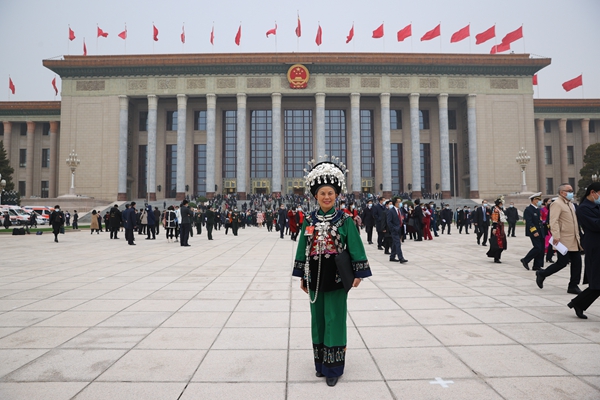

In the beginning, when she established the company, Shi knew that the passing down of the traditional craft would require more than just her own efforts, so she recruited locals-such as those with disabilities that excluded them from manual labor, people who had been laid-off and returning migrant workers-and trained them as needleworkers.
Over the years, the company has offered jobs to more than 4,000 women who have been "left behind "by their husbands, who go to big cities seeking better-paid work, and lifted more than 300 households out of poverty.
Yang Guangrong, 45, one of Shi's few male employees, used to live on a subsistence allowance from the government after injuring his leg in an accident. He has seen his life change since becoming a needleworker at Shi's company in 2017.
"I'm thankful to Shi. After finding out about my situation, she encouraged me to learn embroidery. Now I have stable work and can save money every month," says Yang.
According to Tian Yingzhi, another needleworker, "We all feel grateful to Shi as she has offered us a very good opportunity. The company pays us according to the number of embroidered items we make, so the harder we work, the higher our income."
The company's products are sold in 67 countries and regions. Before the outbreak of COVID-19, between 60 and 70 percent of the company's total output was sold overseas.
The pandemic has impacted Shi's business significantly. "Our sales volume reached 60 million yuan ($9.22 million) in 2019, but was less than 200,000 yuan in the first several months of 2020," says Shi.
Facing the situation head-on, Shi shifted the company's focus to the domestic market, and established an online shop selling sachets, pillows and key chains adorned with Miao embroidery, and also sold products via livestream.
"The pandemic brought us unprecedented pressure, and made us consider how to continue and transform. We want to take this opportunity to attract more young people to use our products through online channels," she adds.
During this year's two sessions, the annual gathering of the National People's Congress and the Chinese People's Political Consultative Conference, held in Beijing, Shi proposed to establish a Miao embroidery research and development center in Songtao to try and engage more young people with the craft, and to cultivate young talent.
After all the hard work over the years, Shi says more young people are now joining the industry compared with 20 years ago.
"Now the majority of staff at my company are young people who were born in the 1980s and 1990s. We need the participation of a greater number of knowledgeable and capable young people in the development of our industry," she says.